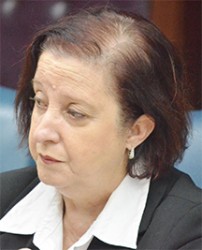Giving Guyana its own law school has climbed higher on Cabinet’s list of priorities in light of the recent decision against Guyanese and other non-UWI law students gaining automatic admission to the Hugh Wooding Law School, says Presidential Advisor on Governance Gail Teixeira.
In an interview with Stabroek News yesterday Teixeira shared that a group, she declined to disclose the identities of the members, has been commissioned to look into the idea, including the cost associated with setting up a law school here.
She continued that the group received its mandate about three weeks ago, and is required to make proposals to cabinet at the end of their work.

Active undertakings towards establishing a local law school started in 2002 when then Legal Affairs Minister Doodnauth Singh asked Head of the University of Guyana’s (UG’s) Law Department, Professor Rudy James, to develop a proposal.
Several factors led to the idea, including government’s decision to discontinue the subsidization of students’ tuition fees at Trinidad’s Hugh Wooding, and the fact that Guyana, through its agreement with the Council of Legal Education (CLE), was only allowed to send 25 UG law graduates to Hugh Wooding to study for their Legal Education Certificates (LEC).
Significant progress was made towards the establishment of the school. Late in 2002, a local task force, compromising then Chancellor of the Judiciary Desiree Bernard, former UG Vice-Chancellor James Rose, former Dean of UG’s Social Science Depart-ment Mark Kirton, and a representative each from the Attorney General’s Office and the Guyana Bar Association, was set up to spearhead the initiative, and a list of the text books, and other such resources were identified.
As opposed to housing the law school on UG’s campus, a building on Parade Street, Kingston, which would house the school’s classrooms, offices and the mandatory Legal Aid Clinic, was selected initially. However, in 2004, UG’s Law Department proposed the school be set up on UG’s campus after encountering difficulties sourcing the funds to carry out the necessary rehabilitative works on the Parade Street location.
A concept paper drawn up by the UG Law Department had estimated annual expenses at around US$81,000, and it was determined that the funds could be generated from a subvention and annual fees of US$179,000. These developments were all significant but the most important development was the CLE’s likely approval of Guyana’s proposal to set up the school.
The school was slated to be opened in 2003, and then in 2004 after several complications made an opening in 2003 impossible. Eventually, the initiative was discarded. Teixeira said yesterday that the funds that would have been required to set up the law school and then run it were much more than government could have afforded at the time considering Guyana’s then debt situation, and the lack of steady economic growth.
There are claims however, that the initiative fell through during discussions to determine payment of the law school’s staff. According to a Senior UG official, the school would have come under the CLE which required that salaries to be paid to lecturers and other officers of the school in Guyana be proportionate to what is paid at other law schools under the CLE. Stabroek News was informed that government was not in agreement with the salaries that would have been required and decided not to go ahead with setting up the school.
Teixeira though, says discussions never got that far, and reiterated that the decision to not go ahead with setting up the school was based solely on the fact that the costs to set up and run the school, at the time, were too high.
She said though, that the idea was never forgotten, and always remained on Cabinet’s list of priorities, albeit not very high.
Earlier this year, the CLE announced that Hugh Wooding Law School would not be accepting UG’s 25 best performing law graduates as per the prior agreement.
Additionally, the CLE said that students from Guyana wishing to enter Hugh Wooding via sitting the entrance examination would not be able to do so.
In fact, the doors into Hugh Wooding are not just closed to Guyana’s students, but students coming from all non-University of the West Indies (UWI) campuses. The reasoning behind the decision is the lack of accommodation.
Hugh Wooding is currently beyond capacity, and is expecting the situation to deepen later this year when about 300 additional students from UWI’s various law faculties begin the 2014/2015 academic year.
Legal Affairs Minister Anil Nandlall says government is intervening, while Caricom Chairman Ralph Gonsalves has written to the CLE asking, among other things, that the decision be revised.
An official from CLE has told Stabroek News that the CLE does not meet again until September, by which time the first semester at Hugh Wooding is slated to begin. In the meantime, the official said, it is possible for the council to take action by way of “round robin.”
The CLE’s chairperson, Jacqueline Samuels-Brown, has said that the only long-term solution to the capacity issue is government intervention, by way of investment, to expand Hugh Wooding’s capacity. Nandlall has said that government would be willing to contribute to such an undertaking.
Meanwhile, UG law students graduating this year are still unclear as to their next step after they graduate.









